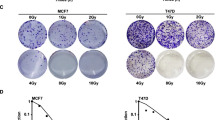Background and Purpose:
Simultaneous radiotherapy with chemotherapy is a standard treatment for inoperable non-small cell lung cancer (NSCLC), but the clinical outcome still remains poor. To further intensify treatment, substances need to be identified, which increase the effect of radiation on tumor cells without further enhancing toxicity to normal tissue. Hormones have a different toxicity profile than radiation or cytostatic drugs. As NSCLC often express estrogen receptors (ERs), the combination of genistein or estradiol and radiation in vitro was investigated.
Material and Methods:
A549 NSCLC cells with an inducible expression of a mutated TP53 and fibroblasts of a male donor (DF-18) were examined. ER expression was immunocytologically confirmed in all studied cell lines. Clonogenic survival was measured after incubation of the cells with genistein or estradiol (0.01 μM and 10 μM as maximum clinically applicable dose) and irradiation with different doses (0–4 Gy). The differentiation state of fibroblasts after combined therapy was analyzed.
Results:
A549 cells expressing mutated TP53 were more radioresistant than TP53 wild-type cells. Incubation of nonfunctional TP53 cells with genistein or estradiol increased radiosensitivity in both tested concentrations. By contrast, radiosensitivity of A549 with wild-type TP53 and DF-18 was not altered by hormonal incubation. In DF-18 radiation induced growth arrest that was not increased by additional hormonal incubation.
Conclusion:
NSCLC cells with nonfunctional TP53 might be sensitized against radiation by genistein or estradiol. As genistein is better tolerable than estradiol in patients, additional studies are warranted to assess potential gains of this combination therapy.
Hintergrund und Ziel:
Etablierte Standardtherapie für inoperable nichtkleinzellige Bronchialkarzinome ist die simultane Radiochemotherapie. Trotz dieser intensiven Therapie ist die Prognose schlecht. Um die Therapie zusätzlich zu intensivieren, müssen Substanzen gefunden werden, die die Bestrahlungseffekte an den Tumorzellen verstärken, ohne die toxischen Nebenwirkungen an Normalgeweben zu erhöhen. Da nichtkleinzellige Bronchialkarzinome oft Estrogenrezeptoren (ERs) exprimieren, wurde die Kombination von Genistein oder Estradiol und Bestrahlung in vitro untersucht.
Material und Methodik:
A549-Bronchialkarzinomzellen mit induzierbarer Expression von mutiertem TP53 und Fibroblasten eines männlichen Spenders (DF-18) wurden untersucht. Die Expression von ER-β und ER-β wurde immunzytologisch in allen untersuchten Zelllinien bestätigt. Das klonogene Zellüberleben wurde nach Inkubation der Zellen mit Genistein oder Estradiol (0,01 μM und 10 μM [klinisch maximal applizierbare Dosis]) und Bestrahlung mit verschiedenen Dosen (0–4 Gy) gemessen. Der Differenzierungsstatus der Fibroblasten wurde nach Einwirken der Kombinationstherapie analysiert.
Ergebnisse:
A549-Zellen mit Expression von mutiertem TP53 waren strahlenresistenter als TP53-Wildtyp-Zellen. Inkubation der TP53-mutierten Zellen mit Genistein oder Estradiol erhöhte die Radiosensibilität in beiden getesteten Hormonkonzentrationen. Die Radiosensibilität der A549-Zellen mit funktionellem p53 und der DF-18-Fibroblasten wurde durch die Hormoninkubation nicht beeinflusst. Bei den Fibroblasten zeigte sich kein Einfluss der begleitenden Hormontherapie auf die strahleninduzierte proliferative Seneszenz.
Schlussfolgerung:
Bronchialkarzinome mit nichtfunktionellem TP53 scheinen durch die Inkubation mit Genistein oder Estradiol radiosensibilisiert zu werden. Da Genistein von den Patienten besser vertragen wird als Estradiol, sollten weitere Studien einen etwaigen klinischen Nutzen durch die Kombinationstherapie untersuchen.
Similar content being viewed by others

Author information
Authors and Affiliations
Corresponding author
Additional information
*The study results were presented as poster at the 2005 DEGRO Meeting in Karslruhe, Germany, and were rewarded a prize.
Rights and permissions
About this article
Cite this article
Hermann, R.M., Fest, J., Christiansen, H. et al. Radiosensitization Dependent on p53 Function in Bronchial Carcinoma Cells by the Isoflavone Genistein and Estradiol in Vitro*. Strahlenther Onkol 183, 195–202 (2007). https://doi.org/10.1007/s00066-007-1561-0
Received:
Revised:
Issue Date:
DOI: https://doi.org/10.1007/s00066-007-1561-0



